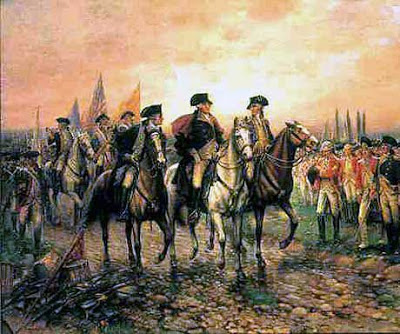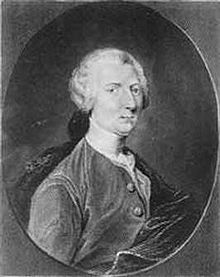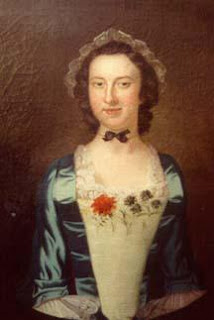Veterans Become Patriots
Many former British officers later settled in America and served in the Continental Army. Some of them were controversial. A previous Yankee Doodle Spies post on Major General Charles Lee is arguably the best example.
You can read about him in A General Disaster:
https://yankeedoodlespies.blogspot.com/2019/07/this-edition-of-yankee-doodle-spies.html.
There were others, such as my recent post on Arthur St. Clair.
You can read about him in Frustrated Founder:
https://yankeedoodlespies.blogspot.com/2021/10/frustrated-founder.html
What, Ho, Horatio!
This post profiles an Englishman whose life became just as uncertain as the fictional Horatio in Shakespeare’s Hamlet. Horatio Gates came from humble beginnings, the son of a housekeeper to the Duke of Leeds. She was said to be his favorite, and why not? On July 26, 1727, she gave birth to a boy in Maldon, Essex, England, who was rumored to be the Duke’s illegitimate son.
For some reason, the Duke favored the young boy from an early age. He received an education far beyond what ordinary servants could afford for a child. And curiously, his servant parents managed to come up with the pounds sterling needed to purchase a commission as an Ensign in the 21st Regiment of Foot in 1745! Methinks a Sugar Daddy Duke played no small role in securing this post. If so, the investment paid off.
Following the Drum
Over the next 25 years, Gates served capably in Britain’s numerous wars, gaining experience in the European War of the Austrian Succession, the Micmac War in North America, and the French and Indian War. Young Horatio developed and excelled in staff skills, a type of work most young and ambitious British officers would avoid whenever possible. He served under many accomplished governors and field commanders like Edward Cornwallis, John Stanwix, and Robert Monckton. The now Major Gates returned to England after the French and Indian War, seconded to the 45th Regiment of Foot.
Love and War
Like many young officers who served in the New World, Gates found love during his time in service. In June 1749, he was sent to Halifax, Nova Scotia, to serve as aide-de-camp to Colonel Edward Cornwallis (uncle of Lord Charles Cornwallis of Yorktown fame). During this period, he met the young Elizabeth Phillips. The young officer was smitten and determined to marry her.
In January 1754, Horatio returned to London, hoping to improve his situation. But when that did not work out, he went back to the New World, specifically Maryland, where he was able to buy a captain’s commission. The captaincy provided him with the income and status he needed, so in October 1754, he returned to Nova Scotia and married Elizabeth, who bore him a son.
During the French and Indian War, young Captain Gates joined his new company in Maryland in March 1755, as it prepared to join General Edward Braddock’s ill-fated expedition against the French and Indians.
You can read about Braddock in Road of Destruction:
https://yankeedoodlespies.blogspot.com/2017/07/things-road-of-destruction.html
Along for the march into the mountains and forests of the western frontier were future notables such as George Washington, Charles Lee, Thomas Gage, and Daniel Morgan. During Braddock’s defeat at the Monongahela River in July 1755, Horatio was severely wounded – he took a musket ball in the chest. His wound took a long time to heal. When he did return to active service, it was for garrison duty along New York’s Mohawk River. Elizabeth was living in New York City during this period.
By 1761, Gates was a major who had become skilled in military administration and a seasoned leader in battle. However, without a war to accelerate progress, advancement in the British Army depended on money and influence. The maid’s son quickly understood that his social status would limit any further promotion. Therefore, he sold his commission in 1769 and returned to America.
With a Little Help from My Friends
The French and Indian War was good for Horatio. It introduced him to the new world and new ways of thinking, where people from humble backgrounds could succeed. Of course, having friends and connections doesn’t hurt, and Horatio was now linked to one of the biggest land sellers and surveyors in America: Colonel George Washington.
Washington helped his fellow French and Indian War veteran buy a 659-acre farm in Virginia’s Berkley County. Gates turned the land into a plantation named Traveler’s Rest. He settled there with Elizabeth and their son, Robert, in 1773. They built a successful plantation and enjoyed a happy married life until political disagreements and increasing unrest turned into open war against the crown.
War Clouds on the Horizon
News of Lexington and Concord reached Traveler’s Rest in May 1775. Horatio wasted no time. He leaped onto one of his chargers and galloped to Mount Vernon, where he offered his services to his fellow veteran and friend, George Washington. At Washington’s recommendation, Horatio Gates received a commission as a brigadier general from the Continental Congress and was named Adjutant General of the Continental Army.
Horatio’s administrative experience in British service was vital to forming a new army. He improved the army’s record-keeping system for orders and unified the structure of regiments from around a dozen states. Horatio was with Washington during the siege of Boston. It always helps to be around the right people at the right time. Impressed with his performance, Washington praised Horatio’s contributions. In 1776, Congress promoted him to major general.
At his request, Gates was assigned a field command—the Canadian Department. However, the American invasion of Canada and the army’s dissolution moved him to a position as an assistant to Major General Philip Schuyler in the Northern Department.
A General Nuisance
Gates rejoined the main Continental Army under George Washington later in 1776. However, Gates’s growing sense of his military superiority led to conflict with his mentor. Gates believed in the superiority of defense over offense and advised Washington to retreat rather than launch a bold and reckless attack on Trenton in the middle of winter.
You can read about the attack on Trenton in Gambling through Defeat and Victory: https://yankeedoodlespies.blogspot.com/2013/12/gambling-through-defeat-and-victory_21.html.
Washington did not follow his advice, so Gates faked an illness to avoid joining the night crossing. He allowed his command to go into battle without its leader. Not a good look.
Danger in the North
Gates bided his time. When the failures in Canada and northern New York impacted Major General Phillip Schuyler (himself no stranger to politics), Gates was sent north to assist and eventually replace him as commander of the Northern Department. He took full command in August 1777.
His organizational skills were essential because the British columns that seized Fort Ticonderoga and moved through the forests to the north were about to attack Albany and cut New England off from the rest of the rebellious states.
Fortunately, the army would soon find out it had plenty of officers capable of leading men on the battlefield. John Stark‘s victory over a sizable British raiding force at the Battle of Bennington showed the British what well-led Americans could do.
The American victories and British surrender at Saratoga shocked the world and pushed the French from silent support to an open alliance with the new American states. The battles of Freeman’s Farm and Bemis Heights in September and October of 1777 led to the defeat of an army of British and German professionals.
Horatio Gates was credited with command in both battles and as the campaign architect. However, his poor management on the battlefield tarnished his reputation. The American strikes and counterstrikes that delivered a heavy blow to General John Burgoyne’s army were only reluctantly approved by Gates. He appeared content to stay in camp while Benedict Arnold, Dan Morgan, Enoch Poor, Charles Dearborn, and other officers led the men into danger.
A Political General?
Still, the commander is responsible for all that his men do and do not do. If the campaign had gone the other way, Gates would have taken the blame at a court-martial and possibly would have been drummed out of the service. Gate’s political instincts told him the first report was the one that mattered. So he immediately sent his Adjutant, James Wilkinson, galloping south to bring the news to Congress – not stopping along the way to inform his commander-in-chief!
Following Saratoga, Gates was appointed President of the Board of War, the military oversight body of Congress, while maintaining his field command. Friends in Congress turned a blind eye to the obvious conflict of interest. And why wouldn't they? They also supported removing General Washington as Commander-in-Chief and replacing him with Gates.
The so-called Conway cabal was a network of officers supporting Horatio Gates’s rise to the highest command. General Thomas Conway, an Irish-French officer, was a supporter of Gates’s cause. However, the alleged plot was exposed. Washington did not act directly, but allowed his allies to attack Conway and others. Notably, on July 4th, Brigadier General John Cadwalader shot Conway in a duel. Ironically, it was Gates’s dishonest aide Wilkinson who uncovered Conway’s schemes.
After a series of attacks, recriminations, and apologies, the affair faded out. Washington’s position was stronger than ever, while Gates was humiliated. In October 1778, Gates was appointed commander of the Eastern Department in Boston, which was now a backwater. He resigned in 1779 and retired to his Virginia plantation. It has never been proven that the circle of officers and politicians supporting Gates was an actual "cabal." But if there was a real conspiracy, it soon fell apart and Gates looked foolish. How involved he was remains a matter of debate. But don't worry, more controversy is ahead.
Song of the South
The post-Saratoga “Southern Strategy” was now benefiting the British, who captured Charleston in May 1780. Thousands of men from the Southern Department and their commander, Benjamin Lincoln, were taken prisoner. Congress and the American people were stunned. The politicians wanted an experienced officer to lead and chose Horatio Gates to command the Southern Department. Eager to rejoin the fight, Gates traveled south and, on July 25, 1780, took command of the disheartened remnants of the army near Deep River, North Carolina.
More trouble was brewing as the British, now under the command of Major General Lord Charles Cornwallis, were consolidating their grip on the Carolinas. Post after post fell, and suddenly the Loyalists gained the upper hand. Gates was under pressure to deliver results quickly. In August 1780, he gathered what forces he had, mostly untrained militia. Gates planned to move southward. But now Cornwallis’s forces were regrouping to face this new threat from the north.
Camden and Chaos
They clashed on August 16 near Camden, South Carolina. Cornwallis took the lead early in the morning. Gates preferred to stay defensive, but his continentals were tired and poorly equipped. His militiamen were inexperienced. All were underfed. Many were sick from eating raw corn. Even without these issues, his army was unprepared for what they faced – the bayonets of determined regulars. They quickly broke and fled in chaos. French-American General Baron De Kalb fell during the battle.
Muskets still rattled as men continued to die when Gates left the battlefield. He rode 70 miles north, not stopping until his foaming horse reached Charlotte, North Carolina that evening. Gates’s claim of seeking a rally point for the army didn't seem believable to most – 70 miles was a long way for rallying troops. He was upset over the defeat at Camden, but in October, his mood sank even further with news of his son Robert’s death in combat at twenty-two.
Board of Inquiry
Gates was relieved and replaced by Nathanael Greene on December 3, 1780. The upset general returned to his plantation to mourn his career and son. Congress demanded a board of inquiry to investigate his actions at Camden. Gates resisted this and called on his political supporters for help. In 1782, Congress canceled the board of inquiry. However, a future command was out of the question. Returning to duty, Gates rode north and joined Washington’s staff at Newburgh, New York. Perhaps this was the ultimate humiliation.
Peace and Prosperity
Although the war was winding down in 1783, Horatio’s troubles were not over. His wife, Elizabeth, died that summer. The last British troops left New York City in late November, and Horatio Gates retired to his Virginia estate. He lived the life of a gentleman planter and also served as the president of the Virginia Society of the Cincinnati – a controversial group of former Continental Army officers. The widowed Gates proposed marriage to Janet Livingston Montgomery, the widow of another former British officer and one of the nation’s first heroes, General Richard Montgomery. But she refused.
Still, during those days, a prosperous gentleman could not remain unmarried. In 1786, he married Mary Valens, a wealthy widow. He chose to move north and live on her estate, Rose Hill Farm, on the Island of New York (today’s Manhattan). Its location near the northern edge of the rapidly growing city was ideal. When he sold Traveler’s Rest in 1790, Horatio conditionally (after five years) freed his slaves on the recommendation of his friend John Adams.
A New Life of Politics, Society & Service
With his new wife Mary by his side, Horatio immersed himself in New York City society and politics. However, he served only one term in the New York State legislature in 1800. As New York had become an anti-Federalist and later Republican stronghold, Gates leaned toward the rising star Thomas Jefferson as a presidential candidate. This change in allegiance ended his friendship with John Adams.
Unlike nearly all of his Revolutionary War peers, Gates devoted much of his wealth to caring for less fortunate veterans of the war. The country's streets were filled with these worn and needy men who sacrificed their lives and futures for a nation that was slow to repay them.
Gates approached his “evening parade” with a growing sense of happiness about joining the new nation and the role, controversial as it was, in fighting for its independence and founding.
Although his career had some "sketchy" moments, Gates, after all, commanded the forces that turned the tide of the war. He did an admirable job helping organize the Continental Army. Sitting out Trenton was a mistake— a mistake of false pride. His actions at Camden were disgraceful on several levels, and although he didn’t face a board of inquiry, the fact was— none was needed.
His actions spoke for themselves. And while he had every reason to stay home at Traveler's Rest, he swallowed his pride and joined Washington at Newburgh in a less prominent role. To me, that makes him a patriot— if not a military genius. So do his efforts on behalf of the beleaguered post-war veterans. He died at his farm on April 10, 1806, at seventy-nine, and was buried in Trinity Churchyard on Wall Street.



























